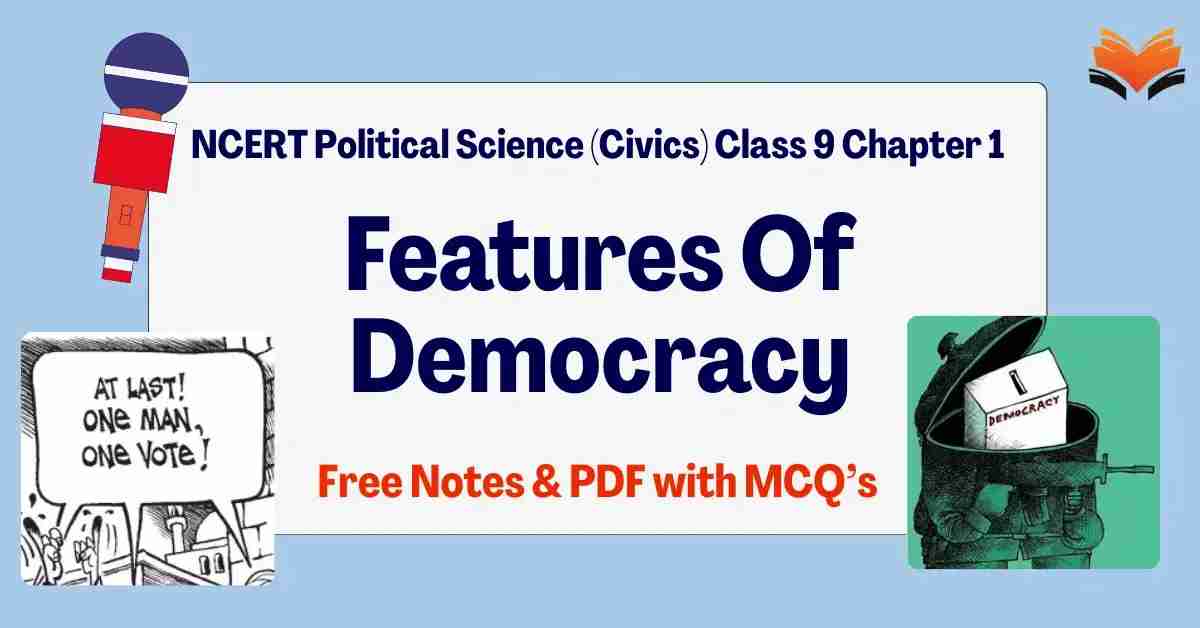Features Of Democracy – Concept & Notes PDF
Topic covered: Features Of Democracy class 9 notes and MCQs Questions: What is Democracy? Why Democracy? (All single detail notes are exam-oriented).
We have discussed in-depth and exam-oriented pointers that can be asked in the board exam of class 9th about the “Features Of Democracy“ from the NCERT Political Science (Civics) notes for class 9th chapter 1 What is Democracy? Why Democracy?.
Download the NCERT Political Science (Civics) for Class 9th Chapter 1 What is Democracy? Why Democracy? Notes PDF
Chapter 1: What is Democracy? Why Democracy? in Class 9 Political Science introduces the meaning of democracy, its features, and why it is considered the best form of government. Many students find it tricky to distinguish between democratic and non-democratic systems, so these notes make the differences clear with simple examples. Key topics like elections, rights, decision-making, and the value of people’s participation are explained in a concise way for easy recall during exams. Download the NCERT Political Science (Civics) for Class 9th Chapter 1 What is Democracy? Why Democracy? Notes PDF to revise quickly and strengthen your understanding.
Features Of Democracy
1. Definition of Democracy:
- Democracy is a form of government in which the rulers are elected by the people.
2. Questions Raised by the Definition:
I. About the rulers:
- Who are considered rulers in a democracy?
- Which officials must be elected for a government to qualify as democratic?
- What decisions can non-elected officials take in a democracy?
II. About elections:
- What constitutes a democratic election?
- What conditions must be met for an election to be considered democratic?
III. About the people:
- Who can elect the rulers?
- Who can get elected as rulers?
- Should every citizen have equal rights in elections?
- Can a democracy deny certain citizens the right to vote or be elected?
IV. About government limits and citizen rights:
- Can elected rulers act without limits in a democracy?
- Must a democratic government function within certain limits?
- Is it necessary for democracy to respect citizens’ rights?
3. Approach to Understanding:
- Each of these questions can be understood and explained using examples.
Major Decisions By Elected Leaders Leaders
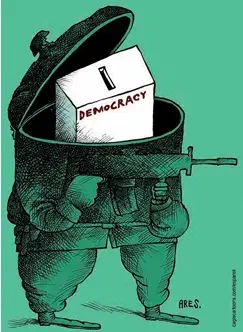
1. Case Study: Pakistan under General Musharraf:
- General Pervez Musharraf led a military coup in October 1999, overthrowing a democratically elected government.
- He declared himself ‘Chief Executive’ and later became President.
- In 2002, he held a referendum granting himself a five-year extension amid claims of malpractices and fraud.
- Musharraf issued a ‘Legal Framework Order’ in August 2002 that amended Pakistan’s Constitution.
2. Key Provisions under the Legal Framework Order:
- The President could dismiss national and provincial assemblies.
- Civilian cabinet work was supervised by a National Security Council dominated by military officers.
- Elections were held for national and provincial assemblies, but final power rested with the military and Musharraf.
3. Why Pakistan under Musharraf was not a Democracy:
- Elected representatives had limited powers and were not the real decision-makers.
- The final authority rested with unelected military officers and Musharraf.
- Presence of elections alone does not guarantee democracy; real power must lie with elected representatives.
- In dictatorships or some monarchies, formal elections exist but real power is not with the people.
- In some countries, real power can even lie with external forces rather than local representatives.
4. First Feature of Democracy:
- In a democracy, final decision-making power must rest with those elected by the people.
Free And Fair Electoral Competition
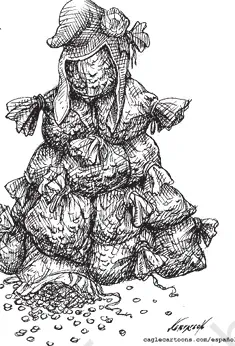
1. Elections in China:
- Elections are held every five years for the National People’s Congress (Quanguo Renmin Daibiao Dahui).
- The Congress appoints the President of China and has nearly 3,000 members.
- Some members are elected by the army.
- Candidates need approval from the Chinese Communist Party (CCP) to contest elections.
- Only CCP members and members of eight allied parties can contest.
- The government is always formed by the Communist Party.
- People do not have a real choice in these elections.
2. Elections in Mexico:
- Presidential elections are held every six years.
- Since independence, Mexico has never been under military or dictatorial rule.
- Until 2000, the Institutional Revolutionary Party (PRI) won every election.
- Opposition parties could contest but never realistically win.
- PRI used unfair tactics: forcing government employees to attend meetings, pressuring teachers, media bias, changing polling booth locations, and heavy campaign spending.
- In practice, people had no real choice even though elections were held.
3. Key Problems Highlighted:
- Elections without genuine competition do not ensure people’s choice.
- Elections can be manipulated through party control, unfair tactics, or lack of alternatives.
4. Second Feature of Democracy:
- Elections must offer a real choice between political alternatives.
- People must have the ability to remove existing rulers through these elections.
- A democracy requires free and fair elections where those in power have a genuine chance of losing.
One Person, One Person, One Person, One Value
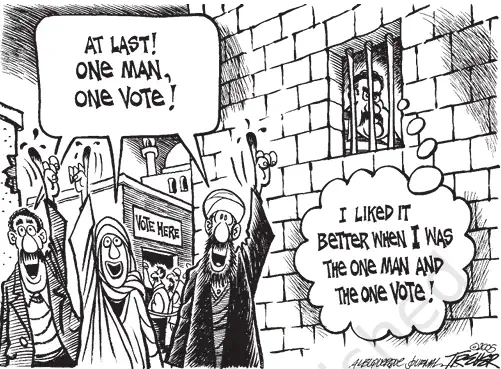
1. Universal Adult Franchise and Political Equality:
- The struggle for democracy has been closely linked to the demand for universal adult franchise.
- This principle of equal voting rights is now accepted almost worldwide.
- Many instances of denial of equal voting rights still exist.
2. Examples of Voting Inequality:
- Saudi Arabia: Women were denied the right to vote until 2015.
- Estonia: Russian minority faces difficulties in obtaining citizenship and voting rights.
- Fiji: Indigenous Fijians’ votes carry more value than Indian-Fijians’ votes.
3. Third Feature of Democracy:
- Democracy is based on political equality.
- Each adult citizen must have one vote, and each vote must carry equal value.
- This principle ensures fairness and equality in democratic decision-making.
Rule Of Law And Respect For Right
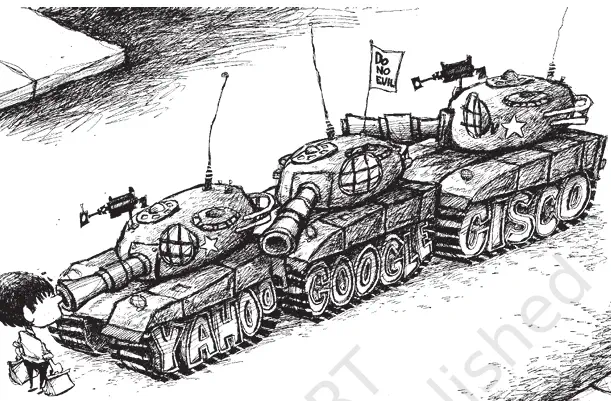
1. Zimbabwe Case Study:
- Zimbabwe gained independence from White minority rule in 1980.
- ZANU-PF, led by Robert Mugabe, ruled the country continuously since independence.
- Elections were held regularly but were often won using unfair practices.
- Mugabe’s government amended the constitution multiple times to increase presidential powers and reduce accountability.
- Opposition party workers faced harassment; public protests and demonstrations were restricted.
- Media was controlled; independent journalists were intimidated or harassed.
- Court judgments against the government were ignored or pressured.
- Mugabe was eventually forced out of office in 2017.
2. Lessons from Zimbabwe for Democracy:
- Popular approval of rulers is necessary but not sufficient for democracy.
- Popular leaders can still be autocratic and undemocratic.
- Assessment of democracy requires observing both election processes and political conditions before and after elections.
3. Fourth Feature of Democracy: Rule of Law and Respect for Rights:
- Citizens must have freedom of thought, opinion, expression, association, protest, and political action.
- Everyone should be equal before the law.
- Independent judiciary must protect citizens’ rights, and its orders must be obeyed.
- Democratic governments cannot act arbitrarily even after winning elections.
- Governments must respect constitutional guarantees, especially for minorities.
- Major decisions should involve consultations, and office bearers are accountable under law and constitution.
- Democratic governance operates within limits set by law and citizens’ rights.
Summary Definition of Democracy
- Democracy is a form of government in which the rulers are elected by the people.
- The simple definition needs clarification of key terms to be meaningful.
1. Four Key Features of Democracy:
- Elected Rulers Take Major Decisions
- Final decision-making power rests with those chosen by the people.
- Free and Fair Elections
- Elections must offer real choice and a fair opportunity for people to change current rulers.
- Political Equality
- All citizens have equal access to the opportunity to vote and contest elections.
- Rule of Law and Citizens’ Rights
- Government operates within constitutional limits and respects citizens’ rights.
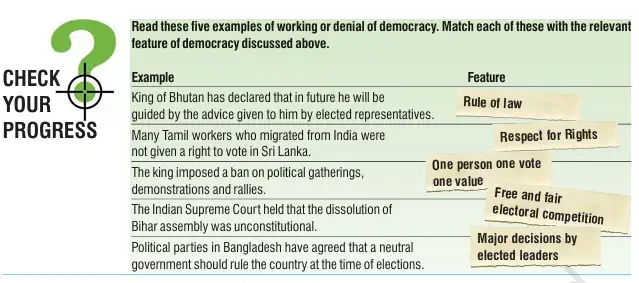
Question: Write What Are The Main Features Of Democracy Class 9 Short Answer?
Answer: The features of democracy class 9 include four major aspects.
- First, the rulers are elected by the people and take all major decisions.
- Second, elections offer a fair choice to the people to change the current rulers.
- Third, every citizen has equal voting rights, following the principle of “one person, one vote, one value.”
- Fourth, a democratic government functions within constitutional limits and respects the rights of citizens.
These points explain the major features of democracy class 9 in a simple and clear way.
Next & Previous Topics of NCERT/CBSE Political Science (Civics) Class 9 Chapter 1: What is Democracy? Why Democracy?
| Topics No. | Topics Name |
|---|---|
| 1 | What Is Democracy |
| 2 | Features Of Democracy |
| 3 | Why Democracy? |
| 4 | Broader Meanings Of Democracy |
MCQs on NCERT Political Science (Civics) Class 9 Chapter 1 Topic – Features Of Democracy Class 9 Notes
Here are the top exam-oriented MCQ-type questions on “Features Of Democracy Class 9 Notes” that you should prepare for your CBSE or state board exams:
Question 1. According to the passage, the first feature of democracy is:
a) Elections are held every five years
b) Final decision-making power rests with those elected by the people
c) Free press exists
d) Citizens pay taxes
Answer: b) Final decision-making power rests with those elected by the people
Question 2. Which example was used to show that elected representatives may not hold real power?
a) China
b) Pakistan under General Musharraf
c) Mexico under PRI
d) Saudi Arabia
Answer: b) Pakistan under General Musharraf
Question 3. In Pakistan under General Musharraf, which body supervised the civilian cabinet?
a) National People’s Congress
b) National Security Council dominated by military officers
c) Supreme Court
d) Federal Parliament
Answer: b) National Security Council dominated by military officers
Question 4. Which country was cited as an example where elections do not offer real choice because only candidates approved by one party can contest?
a) Mexico
b) China
c) Zimbabwe
d) Saudi Arabia
Answer: b) China
Question 5. Why were elections in Mexico not considered truly democratic before 2000?
a) No opposition parties existed
b) The ruling party PRI used unfair practices and opposition could not win
c) There were no elections
d) Only military leaders could vote
Answer: b) The ruling party PRI used unfair practices and opposition could not win
Question 6. The second feature of democracy is:
a) Elections must be held every 10 years
b) Elections must offer a real choice between political alternatives and the opportunity to remove rulers
c) Elections can be ceremonial
d) Only one candidate should contest
Answer: b) Elections must offer a real choice between political alternatives and the opportunity to remove rulers
Question 7. The principle “One person, one vote; one vote, one value” ensures:
a) Citizens pay equal taxes
b) Political equality for all adult citizens
c) Only rich citizens vote
d) Voting is optional
Answer: b) Political equality for all adult citizens
Question 8. Which country denied women the right to vote until 2015?
a) Estonia
b) Fiji
c) Saudi Arabia
d) Zimbabwe
Answer: c) Saudi Arabia
Question 9. In Fiji, why was the principle of equal value of votes violated?
a) Some ethnic groups were denied citizenship
b) The vote of an indigenous Fijian had more value than that of an Indian-Fijian
c) Women could not vote
d) Only military officers could vote
Answer: b) The vote of an indigenous Fijian had more value than that of an Indian-Fijian
Question 10. The third feature of democracy is:
a) Government ruled by kings
b) Free press
c) Every adult citizen must have one vote and each vote must have equal value
d) Elections every five years
Answer: c) Every adult citizen must have one vote and each vote must have equal value
Question 11. Which example illustrates the importance of rule of law and respect for rights in a democracy?
a) Pakistan under Musharraf
b) Zimbabwe under Robert Mugabe
c) Mexico under PRI
d) China
Answer: b) Zimbabwe under Robert Mugabe
Question 12. A democratic government cannot do whatever it wants because:
a) It is always weak
b) It must respect basic rules, constitutional limits, and citizens’ rights
c) Citizens do not care
d) Only the army controls it
Answer: b) It must respect basic rules, constitutional limits, and citizens’ rights
Question 13. The fourth feature of democracy is:
a) Elections every year
b) Government functions within constitutional limits and respects citizens’ rights
c) Only the ruling party makes decisions
d) Citizens cannot protest
Answer: b) Government functions within constitutional limits and respects citizens’ rights
Question 14. Which of the following is the correct summary definition of democracy based on the four features?
a) Government run by kings and generals
b) Government where rulers elected by the people take major decisions; elections offer choice; everyone votes equally; government is limited by laws and rights
c) Government with regular elections only
d) Government where army controls decision-making
Answer: b) Government where rulers elected by the people take major decisions; elections offer choice; everyone votes equally; government is limited by laws and rights
Question 15. Which of the following statements is true about elections in a democracy?
a) Elections are only symbolic
b) Elections must give a fair opportunity to remove the existing rulers
c) Elections are unnecessary if the ruler is popular
d) Only one candidate should be allowed
Answer: b) Elections must give a fair opportunity to remove the existing rulers
Question 16. In a democracy, why is popular approval of rulers not sufficient?
a) Popular rulers may still act autocratically and violate citizens’ rights
b) Elections do not matter
c) Only economic growth matters
d) Popularity is enough for democracy
Answer: a) Popular rulers may still act autocratically and violate citizens’ rights
Question 17. Which feature ensures that minority groups’ rights are protected in a democracy?
a) Free press
b) Government limited by constitutional law and citizens’ rights
c) One-party system
d) Army supervision
Answer: b) Government limited by constitutional law and citizens’ rights
Question 18. Which of the following is an example where elections alone did not make a country democratic?
a) United States
b) Pakistan under Musharraf
c) India
d) Japan
Answer: b) Pakistan under Musharraf
Question 19. Why is it important to look at government functioning before and after elections in a democracy?
a) To ensure economic policies are good
b) To ensure political rights, freedom of expression, and accountability are respected
c) To maintain army control
d) To enforce dictatorship
Answer: b) To ensure political rights, freedom of expression, and accountability are respected

